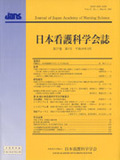Japanese
English
- 販売していません
- Abstract 文献概要
- 参考文献 Reference
- サイト内被引用 Cited by
要旨
本研究は,デイケアに通所中(在宅生活)の69名の統合失調症患者を対象に,変数をグループ化した(人口学的要因,臨床特性,症状の重症さ,能力,自尊感情)概念枠組みを作成し,Quality of lifeを予測するものを2年間の追跡調査を用いて明らかにすることを目的とした.その際,交絡要因としての抗精神病薬1日服用量をコントロールした.結果,1年後と2年後の追跡調査において,自尊感情はQuality of lifeの4領域すべての予測因子であった.Quality of lifeの身体的領域と心理的領域に対する自尊感情の寄与率は,時間が長くなるほど大きくなった.社会的関係と環境領域に対する自尊感情の寄与率は,1年後と2年後の値がほぼ同程度であり,自尊感情のQuality of lifeへの影響は安定していた.
Abstract
From a 2-year follow-up survey, this study aims to identify variables that predict quality of life using a conceptual framework (socio-demographics, clinical characteristics, severity of symptoms, ability, and self-esteem) developed by grouping variables. The subjects were 69 schizophrenic patients receiving daycare. Daily doses of antipsychotics were controlled as a confounding factor. In the survey, self-esteem was found to be the predictor in 4 domains of their quality of life. Also, proportion of physical and psychological dimensions in quality of life predicted by self-esteem increased over time, while proportion of the social relationships and environmental dimension remained stable.
Copyright © 2007, Japan Academy of Nursing Science. All rights reserved.


